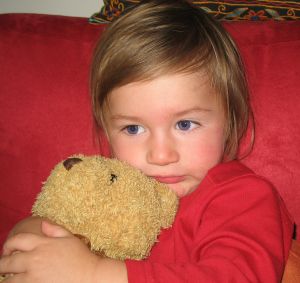By Rita Brhel, managing editor of Attached Family magazine, API’s Publications Coordinator and an API Leader (Hastings API, Nebraska). Originally published on TheAttachedFamily.com in October 2008.
 My friend, Nicole, and her husband both work full-time. Their two-year-old daughter spends the day with a childcare provider who has watched her since she was six weeks old. Oftentimes, Nicole comes home after a 45-minute commute tired, wanting to relax and spend time playing happily with her daughter.
My friend, Nicole, and her husband both work full-time. Their two-year-old daughter spends the day with a childcare provider who has watched her since she was six weeks old. Oftentimes, Nicole comes home after a 45-minute commute tired, wanting to relax and spend time playing happily with her daughter.
When her child was younger, Nicole would breastfeed to help reconnect in the evenings, but as her daughter grew into a toddler and weaned, the challenge of creating a peaceful evening has mounted. Her daughter, hungry for her attention, seems to push the limits constantly, often bringing home acting-out behaviors she’s learned from older children in her daycare. While Nicole believes that discipline is important, she doesn’t want to ruin the evening, and tends to discipline inconsistently, choosing not to discipline when it appears her child is starting a tantrum.
When you’ve spent most of the day away from your child, it’s natural to want to come home and spend a peaceful evening relaxing and playing together. But some busy parents have difficulty finding quality time to spend with their child. The parents’ priority may be to enjoy a phone conversation with a friend, to watch television for an hour, or to have a family dinner at a local restaurant. The children, anxious for their parents’ undivided attention, may express their frustration through tantrums and other acting-out behavior, quickly causing tension for the entire family. Should these parents, like Nicole, let discipline go by the wayside in an effort to have a more peaceful evening?
Consistent Discipline Always Important
Discipline is a very important component of Attachment Parenting (AP). As outlined by Attachment Parenting International’s Eight Principles of Parenting, discipline is an essential tool in helping children to develop a conscience, especially as the child grows and becomes more independent. But a key part of AP discipline is teaching children, not by reacting to their behavior, but by meeting the needs that lead to undesirable behavior. The same holds true for stressed, dual-income families seeking quality family time in the evenings after the children come home from daycare and before they go to bed.
Reconnecting after being apart for a day is essential for working families, according to Jane Nelsen, EdD, in her 2005 article “Seven Ways Busy Parents Can Help Their Children Feel Special,” posted on www.positivediscipline.com.
“Helping your child feel special is a matter of planning and habit, not a lack of time,” writes Nelsen, who co-authored Positive Discipline for Working Parents.
Here are some of her tips to help parents to reconnect with their children at the end of the day:
- Take time for hugs – Don’t underestimate the power of a hug in changing attitudes, yours and your children’s. Hugs can also be significant in stopping acting-out behavior.
- Involve your children in rule-setting – Children are much more enthusiastic about following rules that they’ve had a part in setting. Help them come up with creative ways of getting their chores done or setting morning and bedtime routines, and brainstorm solutions for other issues that tend to be contentious.
- Include your children in your chores – Your children will feel empowered when you ask them for help, instead of lecturing or scolding. Instead of getting angry that there are toys all over the floor of the family room, ask them to help clean it up.
- Regularly schedule special time with the children – Set aside some one-on-one time together with each of your children. Nelsen recommends at least 10 to 15 minutes a day for young children and at least 30-60 minutes a week for school-age children, although many parents would argue that children need more one-on-one time with their parents than this. Actually putting this quality time in your calendar means you’re making it a priority, and even when an evening is particularly hectic, your children will know that you will be available for their special time.
- Take time to listen and share – Ask your child to share her happiest and saddest moments of the day. Perhaps you do this during your special time together, or at bedtime as Nelsen recommends. Listen without trying to solve problems, and then take your turn to tell your own happy and sad moments.
- Write a note to your child – Put a hand-written note in your child’s lunch box, on his pillow, or tape it to the bathroom mirror. The notes, like hugs, give children a boost during the day.
- Take advantage of errands – Whether you’re going grocery shopping, to the bank, or dropping mail off at the post office, the drive time during these errands provides additional one-on-one time for your child. If you have several children, have them take turns. Take this time to listen to whatever your child wants to talk about, and share special stories from your life, such as when you were younger.
Children may act out because they feel they aren’t receiving enough undivided attention from their parents. By taking the time to reconnect with their children, parents are not only fulfilling children’s needs but also giving themselves exactly what they need – children who feel right with themselves and with their families, and who are less likely to act out. And if children do have a tantrum or act out, those who feel connected respond more positively to their parents’ discipline.
A key part of AP discipline is teaching children, not by reacting to their behavior but by meeting the needs that are leading to the undesirable behavior.